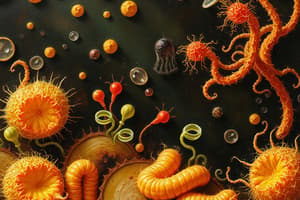Podcast
Questions and Answers
What is the primary function of microorganisms in decomposition?
What is the primary function of microorganisms in decomposition?
- Producing antibiotics to combat fungal infections
- Fixing atmospheric nitrogen
- Breaking down organic matter to recycle nutrients (correct)
- Enhancing nutrient uptake in plant roots
Which type of bacteria is commonly associated with yogurt production?
Which type of bacteria is commonly associated with yogurt production?
- Streptococcus pneumoniae
- Rhizobia
- Escherichia coli
- Lactobacillus (correct)
What is the term for the beneficial bacteria that aid digestion and immune system function in the human gut?
What is the term for the beneficial bacteria that aid digestion and immune system function in the human gut?
- Mycorrhizal fungi
- Rhizobia
- Probiotics
- Gut microbiome (correct)
Which of the following is an example of a viral pathogen?
Which of the following is an example of a viral pathogen?
What is the primary mechanism by which bacteria develop antibiotic resistance through genetic mutation?
What is the primary mechanism by which bacteria develop antibiotic resistance through genetic mutation?
Which of the following is a consequence of antibiotic resistance?
Which of the following is a consequence of antibiotic resistance?
What is the term for the live microorganisms that confer health benefits when consumed?
What is the term for the live microorganisms that confer health benefits when consumed?
Which of the following is an example of a fungal pathogen?
Which of the following is an example of a fungal pathogen?
What is the term for the symbiotic relationships between fungi and plant roots that enhance nutrient uptake?
What is the term for the symbiotic relationships between fungi and plant roots that enhance nutrient uptake?
Which of the following strategies can help combat antibiotic resistance?
Which of the following strategies can help combat antibiotic resistance?
Flashcards are hidden until you start studying
Study Notes
Beneficial Microorganisms
- Food Production:
- Yeast (fermentation in baking and brewing)
- Bacteria (lactobacillus in yogurt and cheese production)
- Human Health:
- Gut microbiome: beneficial bacteria aid digestion and immune system function
- Probiotics: live microorganisms that confer health benefits when consumed
- Environment:
- Decomposition: microorganisms break down organic matter, recycling nutrients
- Nitrogen fixation: certain bacteria convert atmospheric nitrogen into usable form
- Agriculture:
- Rhizobia: bacteria that fix nitrogen in legume roots, increasing crop yield
- Mycorrhizal fungi: symbiotic relationships with plant roots, enhancing nutrient uptake
Pathogenic Microorganisms
- Bacterial Pathogens:
- Gram-positive: Staphylococcus aureus, Streptococcus pneumoniae
- Gram-negative: Escherichia coli, Pseudomonas aeruginosa
- Viral Pathogens:
- DNA viruses: Adenovirus, Herpesvirus
- RNA viruses: Influenza, HIV
- Fungal Pathogens:
- Moulds: Aspergillus, Fusarium
- Yeasts: Candida albicans
- Protozoan Pathogens:
- Parasites: Plasmodium (malaria), Giardia lamblia
Antibiotic Resistance
- Mechanisms of Resistance:
- Genetic mutation: bacteria develop mutations to evade antibiotic action
- Horizontal gene transfer: bacteria share resistant genes
- Efflux pumps: bacteria expel antibiotics from cells
- Consequences of Antibiotic Resistance:
- Increased morbidity and mortality: infections becoming harder to treat
- Prolonged hospital stays: increased healthcare costs
- Emergence of superbugs: highly resistant bacterial strains
- Strategies to Combat Antibiotic Resistance:
- Antibiotic stewardship: responsible antibiotic use
- Vaccine development: prevention of infections
- Development of new antibiotics: research into novel antimicrobial compounds
Beneficial Microorganisms
- Yeast is used in fermentation for baking and brewing
- Lactobacillus bacteria are used in yogurt and cheese production
- The gut microbiome consists of beneficial bacteria that aid digestion and immune system function
- Probiotics are live microorganisms that confer health benefits when consumed
- Microorganisms break down organic matter, recycling nutrients through decomposition
- Certain bacteria, such as rhizobia, convert atmospheric nitrogen into a usable form through nitrogen fixation
- Mycorrhizal fungi have symbiotic relationships with plant roots, enhancing nutrient uptake
- Rhizobia bacteria fix nitrogen in legume roots, increasing crop yield
Pathogenic Microorganisms
- Staphylococcus aureus is a gram-positive bacterial pathogen
- Streptococcus pneumoniae is a gram-positive bacterial pathogen
- Escherichia coli is a gram-negative bacterial pathogen
- Pseudomonas aeruginosa is a gram-negative bacterial pathogen
- Adenovirus is a DNA virus that causes disease
- Herpesvirus is a DNA virus that causes disease
- Influenza is an RNA virus that causes disease
- HIV is an RNA virus that causes disease
- Aspergillus is a mould that causes disease
- Fusarium is a mould that causes disease
- Candida albicans is a yeast that causes disease
- Plasmodium is a protozoan parasite that causes malaria
- Giardia lamblia is a protozoan parasite that causes disease
Antibiotic Resistance
- Bacteria can develop genetic mutations to evade antibiotic action
- Bacteria can share resistant genes through horizontal gene transfer
- Bacteria can expel antibiotics from cells using efflux pumps
- Antibiotic resistance increases morbidity and mortality
- Antibiotic resistance leads to prolonged hospital stays and increased healthcare costs
- Antibiotic resistance can result in the emergence of superbugs
- Antibiotic stewardship involves responsible antibiotic use to combat resistance
- Vaccine development can help prevent infections and combat antibiotic resistance
- Research into novel antimicrobial compounds is necessary to combat antibiotic resistance
Studying That Suits You
Use AI to generate personalized quizzes and flashcards to suit your learning preferences.




